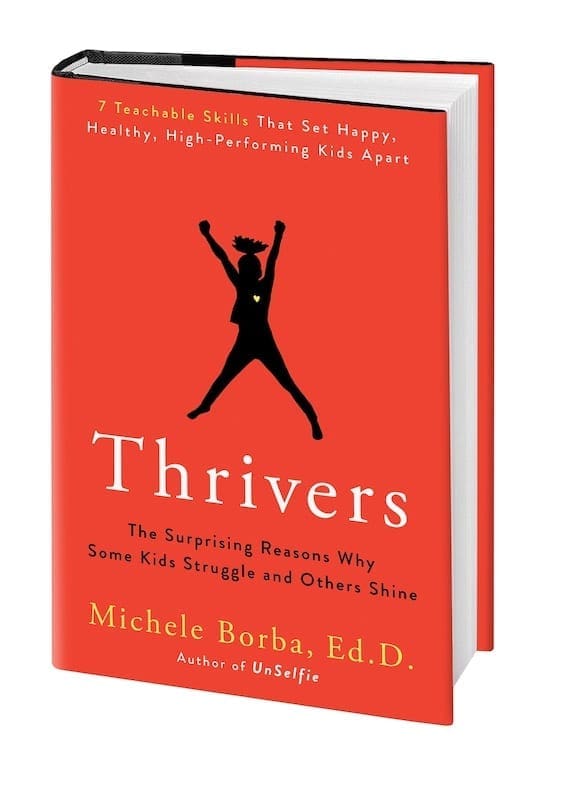A Conversation with Dr. Michele Borba about Thrivers
In her new book Thrivers, Dr. Michele Borba helps parents and educators teach the essential character strengths kids need to become young people who flourish in a rapidly changing, digitally-driven, and uncertain world.
As a teacher, educational consultant, and parent for 40 years, Dr. Borba has never been more worried for young people than she is about this current generation of kids. Across the nation, student mental health is plummeting, depression rates among teens are rising, kids are reporting severe anxiety at ever-younger ages. When Dr. Borba asks a group of students to “tell me about your generation,” most respond with stories of stress, anxiety, isolation, and fear.
But some young people aren’t struggling; they’re thriving. They cope with adversity, develop healthy relationships, and embrace change. They are ready for whatever the world throws at them, even in uncertain times. Dr. Borba calls these kids Thrivers, and the more she studied them, she wondered, What is their secret? And can it be taught to others?
Seven Essential Character Strengths
For her book, Dr. Borba combed scientific studies on resilience, spoke to dozens of researchers and experts in the field, and interviewed more than 100 young people from all walks of life. In the end she found something surprising. The difference between those who struggle and those who succeed comes down not to grades or test scores, but to seven essential character strengths that set Thrivers apart (and set them up for happiness and greater accomplishment later in life):
- Self-confidence: Healthy identify, using personal strengths to find purpose and meaning.
- Empathy: Understanding and sharing another’s feelings, and acting compassionately.
- Self-control: Managing stress, delaying gratification, strengthening focus.
- Integrity: Valuing and adhering to strong moral code, ethical thinking to lead a moral life.
- Curiosity: Having open-mindedness and willingness to try new ideas, take risks, innovate.
- Perseverance: Exhibiting fortitude, tenacity and resolve to endure so as to bounce back.
- Optimism: Learning self-advocacy and keeping unrealistic pessimism to encourage hope.
Each of these seven character strengths is like a superpower that helps safeguard kids against the depression and anxiety that threatens to derail them. And when those superpowers are combined, they become even more potent, creating a Multiplier Effect that prepares children to succeed in our fast-paced, ever-changing world. The best news of all: these strengths aren’t inborn. They can be taught.
A Q&A Conversation with Dr. Borba about Thrivers
You’ve worked for 40 years as an educator, educational psychologist, and parent — when did you first realize the need for this book?
Over the last decade American children’s mental health has spiraled downward. One in four college students is now diagnosed for a mental health disorder; suicide rates in 10 to 14 years old has more than doubled in two decades. Data shows that today’s kids — prior to the pandemic — were the loneliest, saddest, most anxious, least creative and least self-sufficient generation on record.
A mom emailed me pleading for help: their suburban community lost forty kids in two-and-a-half years to suicide within a twenty-mile radius was my wake-up call. The following week a high school guidance counselor called to say that their community was a suicide belt: so many kids were taking their lives. I’ve never been more concerned about kids than now — they are failing to thrive, and if left as is this will have grave consequences on our kids’ futures.
What do you think is driving the feelings of depression, anxiety, and isolation that many kids report having?
While we’ve raised a generation of smart children who have more of everything, but we’ve forgotten to give them the thing they need most to succeed: the mental and moral qualities that make them human. Character is what builds mental strength, genuineness, and wholeness and helps turn kids who strive into young adults who thrive in a fast-paced, every-changing world.
But our culture focuses on our children’s other side: GPA and test scores, so our kids lack inner strength. A tween told me: “We’re being raised to be products and are missing the pieces on how to be people, so we all feel empty.” That’s a toxic formula for raising resilient kids.
Can focusing less on grades and competitive success really lead a child to perform better academically?
To thrive in today’s technologically-driven, competitive, rapidly changing world, kids need more than grades, rank and scores; they also need strength of heart, mind and will. It’s why our narrow definition of success must be widened to include both. Our hyper-focus on cognitive abilities increases children’s stress, compromises their cognitive and focusing abilities, and reduces their grit, curiosity and confidence.
Peak performers don’t stress either (academics) or (character), but both. Our mistake is emphasizing achievement in lieu of character, which greatly undermines kids’ thriving potential and it’s why we must widen the definition of success.
How did you identify the Seven Essential Character Strengths that kids need to thrive?
The selection of the essential seven (self-confidence, empathy, integrity, self-control, curiosity, perseverance and optimism) was based on six rigorous benchmarks. Each character strength is scientifically proven to increase children’s resilience; deemed “essential” for the 21st century; recognized as a universal strength that boosts character, shown to optimize learning performance and increases mental health and well-being.
Each strength must also be teachable and not “fixed” or based on personality, IQ, or income. Finally, I personally interviewed over 500 students and they also confirmed that the seven traits were missing in their lives and that learning them would help them thrive.
You’ve identified Seven Essential Character Strengths that kids need to thrive. Is there one strength that you believe is most important?
Self-confidence is the first crucial Character Strength and most important, because the other six traits build from it. Once kids appreciate their unique talents and interests, they are more curious about life, more motivated to succeed and have inner strength to overcome adversity.
It’s why we must respect our kids for who they are, not what we want them to become. Too many kids suffer from flimsy self-views that jeopardizes their potential to thrive and makes them feel empty.
You refer to the Multiplier Effect. What is it and how does it help kids thrive?
Parents put all efforts into nurturing one strength in hopes it gives their kid a success edge. Wrong! Resilience is not one single trait, but many. Thriving potential increases when Character Strengths are combined (Self-Confidence + Curiosity increases self-assuredness and creativity. Self-Control + Perseverance) because it creates a Multiplier Effect and boosts achievement odds.
New findings show that kids who are more adept at navigating life because they use several strengths together. That’s the parenting approach that raises thrivers.
At what age should parents begin using your strategies to teach these Character Strengths?
Science confirms that it is never too early or late to learn Character Strengths. Parents need to continually reinforce these qualities in kids from sandbox to prom. Most young people enter the “real world” never having been schooled in the teachings of character, so they face a huge life disadvantage. Thrivers provides those crucial missing lessons so kids of all ages will thrive. We haven’t a moment to lose.
Our kids are experiencing a global pandemic. What effect do you think it had on our children?
The pandemic began when young people were already experiencing heightened and increasing rates of depression, anxiety and suicide. Any crisis — whether a pandemic, mass shooting, terrorist attack, natural disaster — only amplifies pre-existing issues.
That’s why we must rethink our parenting so it includes helping our children acquire skills they will need for their uncertain future. The seven essential Character Strengths will serve as buffers kids need to handle whatever comes their way so they are more likely to shine, not struggle.
The book is packed with simple strategies, practical ideas, and step-by-step advice for teaching mental and moral qualities essential for long-term success. How do you know these strategies really work?
My goal was to find proven strategies that increase children’s mental, emotional and moral strengths. I combed child development research and observed stellar teachers and counselors implementing practices based on those findings. Educators attested that the activities improved students’ academic performance as well as emotional well-being. Those 300 resilience-building activities featured throughout the book are easy to use — and none cost a dime.
You interviewed more than 500 children of all ages for this book. Was there one kid or story that sticks with you?
One sixteen-year-old sticks with me most because her story personifies many kids I interviewed. Eva was smart and talented with exemplary test scores and grades and a non-stop array of sports, activities and AP classes. But she never felt “enough” and constantly strived to do more to please her parents. It all became too much and Eva was hospitalized with severe depression.
Her mother’s comment was heart-wrenching: “I thought I’d given her everything she needed to be happy and successful, but I was so wrong. I missed helping her enjoy herself.” I hear the same sad stories from many parents, but always when they realize that their kids are overwhelmed and hurting. Eva convinced me we must realign our parenting so kids have tools to thrive, not struggle, and enjoy their own company.
For the book you scoured scientific studies and spoke with experts about resilience and child development. What was one thing you were especially fascinated to learn?
Thrivers are made not born. It is a desperately needed skill set at the same time as it is profoundly misunderstood. Resilience is not all or nothing. It is not something you are born with or born without. Once I realized that the ability to thrive is made up of teachable skills that every child needs, I knew I had to offer them to parents and educators so they could instill them in their children.
You’ve written many books on parenting and child development, what’s new here for parents and educators today?
We are raising a unique generation that has faced a pandemic, school shootings, terrorism, and natural disasters along with intense pressures to succeed like no other past cohort. Thrivers provides parents and educators with an updated guide to teach skills our kids will need now and later to handle an unpredictable world. Instilling these seven Character Strengths may well be the greatest gift we leave our kids.

Michele Borba, EdD
Website
YouTube: Helping Kids Video Series
Facebook
Twitter
This post contains affiliate links via Bookshop, whose mission is to financially support local, independent bookstores.
Provided by Dottie DeHart
Top photo by Sebastian Voortman from Pexels
Other photos provided by Dr. Borba
More Girls That Create Posts
Eight Ways to Help Your Daughter Find Her Voice
Part One of Two Author Jessica Lahey: Music to My Ears
13 Resilience Building Tips for Your Daughter in a Crisis-Prone World


